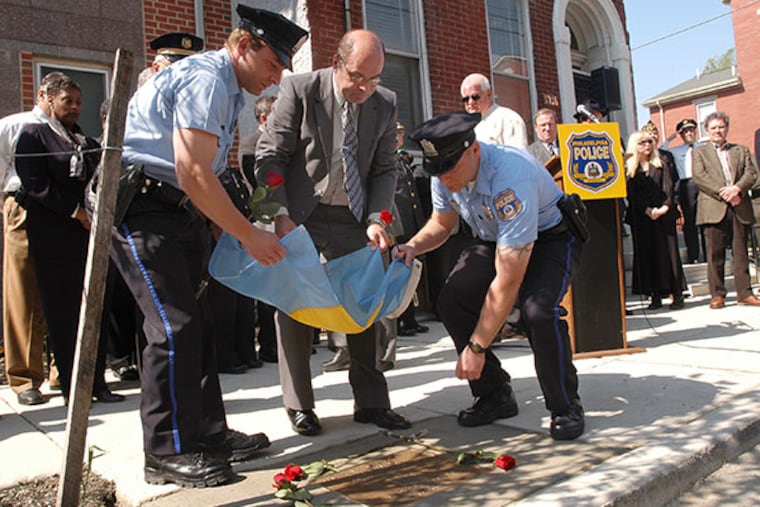44 years later, officer's killing still unsolved
For every homicide in Philadelphia - every street-corner shooting, every robbery gone wrong - there is a file folder full of evidence at Police Headquarters.

For every homicide in Philadelphia - every street-corner shooting, every robbery gone wrong - there is a file folder full of evidence at Police Headquarters.
For the murder of Officer Frederick Cione, there are 24 folders.
Cione's shooting is the department's only unsolved police homicide and one of the city's most enduring criminal mysteries.
And as the 44th anniversary of his death draws near, Philadelphia police are offering a combined $40,000 from the department, the police union, and the National Police Defense Foundation for any information leading to Cione's killer.
Details surrounding the decades-old killing are scant, and what little investigators know was pieced together from initial reports by eyewitnesses.
The 25-year-old rookie officer from Kensington was on patrol at 1:10 a.m. Jan. 30, 1970, when he tried to stop three men walking near 17th and Oxford Streets in North Philadelphia.
One of the men pulled a gun and fired three times as Cione was getting out of his car.
Two bullets hit Cione, who was found lying in the gutter on Oxford Avenue, his gun still in its holster.
Authorities brought dozens of people in for questioning and sent 75 detectives out on the street, going door-to-door in search of leads, according to a Philadelphia Daily News story published on the 25th anniversary of the killing.
"What little information witnesses could give, they gave," said Detective Greg Rodden, who has been assigned to Cione's case for the last two months.
Billboards dotted the city in 1976, promising a $5,000 reward for information in the case.
A Bucks County man jailed in Texas confessed, but police later determined he was lying. In 1980, the Daily News reported that a man wanted in the murder of a fish merchant had bragged to several friends that he had killed Cione.
But none of the leads authorities have pursued over the years has solidified.
"A couple of names came up, but we never had quite enough to make an arrest," said Capt. James Clark, who heads the homicide unit.
Over the last 44 years, Cione has been the subject of dozens of newspaper stories. A plaque on Oxford Avenue commemorates the spot where he fell. Family members and former colleagues speak of him as a young man whose only goal in life was to become a police officer.
A Vietnam War veteran, Cione entered the Police Academy when he returned home. In the weeks before he was killed, he and his classmates had been planning a celebration to commemorate their first year on the force.
He was not married and had no children. His parents died without seeing his killer arrested, tried or imprisoned. After his death, his younger brother - and, eventually, his nephews, who never met their uncle - joined the force themselves.
On Thursday, family members and department officials gathered at Police Headquarters to plead, once more, for any information on the case.
"Maybe you know something directly; maybe you heard a story," Police Commissioner Charles H. Ramsey said, adding that potential tipsters shouldn't hesitate to call the department - even if they believe their information is insubstantial. "Don't make that determination on your own," Ramsey said.
Nicholas Cione, Frederick's brother - a retired civil affairs detective who joined the force after the slaying - said he was grateful to the department and the foundation, which for the first time is offering a reward for information in a cold case.
In the years since his brother's death, the Ciones have tried to keep his memory alive.
"Forty-four years is a long time," Cione said. "It's not that you forget. You just try to keep going."